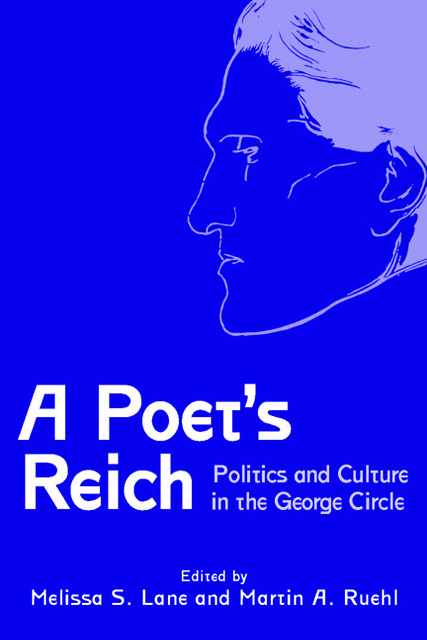10 - Third Reich and Third Europe: Stefan George’s Imperial Mythologies in Context
Published online by Cambridge University Press: 10 February 2023
Summary
For Most National Socialist Propagandists, the German Reich began with the Saxon king Henry the Fowler (876–936) and his imperial descendants. They denounced Charlemagne, accordingly, as the butcher of the Saxons (Sachsenschlächter) and a traitor to the national cause, because he championed the idea of Rome. The reprobation of Charlemagne on the part of German nationalists had long been fuelled by racial as well as kleindeutsch and Protestant concerns. Hitler himself took a different view: “Wenn wir überhaupt einen Weltanspruch erheben wollen,” he declared in February 1942, “müssen wir uns auf die deutsche Kaisergeschichte berufen. Die Kaisergeschichte ist das gewaltigste Epos, das — neben dem alten Rom — die Welt je gesehen hat.” In his table talk, Hitler resolutely defended Charlemagne and at times even invoked him as a model for his own policies. Hitler’s vision of Charlemagne and his empire differed in a number of important ways from what the distinguished medievalist Otto Westphal termed the idea of a Carolingian International. This idea became a practical possibility only after 1945, as is evidenced by the remark of a French officer who described the task of European reconstruction as “refaire l’empire de Charlemagne.” The Carolingian International was one of many mythical conceptions of the Reich that were circulating in Weimar Germany. These imperial mythologies, which will be explored below, form a crucial backdrop to George’s thinking, after the First World War, about Germany, Europe, and Germany’s role in Europe.
The Carolingian International
In the wake of the Great War, German scholars and intellectuals invoked the Holy Roman Empire not just for revanchist reasons, but also to historically legitimize a pacifist, cosmopolitan, and Christian conception of Europe. As Hermann Platz, spokesperson of the Catholic Center party, stated in his book Um Rhein und Abendland (1924): “Das Rechte, das heute als Neuanfang gesetzt werden muss, … das ist die abendländische Idee. Das ferne Symbol ist die Krone Karls des Großen.” The Carolingian Empire, symbolized by Charlemagne’s crown, was supposed to give genealogical substance to the pan-European project. For the (frequently Catholic) proponents of this variant of the Reichsidee, Franco-German rapprochement was a fundamental precondition for European unification, which they conceived as a return to the Frankish, and thus Franco-German, Empire of Charlemagne.
- Type
- Chapter
- Information
- A Poet's ReichPolitics and Culture in the George Circle, pp. 251 - 268Publisher: Boydell & BrewerPrint publication year: 2011



